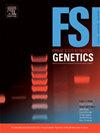法医调查中的 CRISPR-Cas 技术:原理、应用和伦理考虑。
IF 3.2
2区 医学
Q2 GENETICS & HEREDITY
引用次数: 0
摘要
CRISPR-Cas(Clustered Regularly Interspaced Short Palindromic Repeats and CRISPR-associated proteins)系统是一种适应性免疫系统,最初存在于细菌中,对抵御病毒和质粒等外部遗传因子至关重要。利用这一系统的优势,基于 CRISPR-Cas 的技术已成为精确编辑基因组的不可思议的工具,从而极大地推动了多个研究领域的发展。法医学是一个多学科领域,它探索调查和解决法律问题的科学方法,特别是刑事调查和主体鉴定。因此,它在司法系统中发挥着至关重要的作用,为司法调查提供科学证据支持。虽然探索较少,但基于 CRISPR-Cas 的方法因其高精度和高灵敏度,在法医学领域展现出强大的潜力,包括 DNA 分析和鉴定、犯罪现场调查解读、食品污染或欺诈检测,以及与环境法医学相关的其他方面。然而,在人类样本中使用基于 CRISPR-Cas 的方法会引发一些伦理问题,以及对个人基因信息可能被滥用的担忧。在本手稿中,我们概述了基于 CRISPR-Cas 的方法学在法医学多个领域的潜在应用,并讨论了这些方法学在这一研究领域的常规应用所面临的法律问题。本文章由计算机程序翻译,如有差异,请以英文原文为准。
CRISPR-Cas technology in forensic investigations: Principles, applications, and ethical considerations
CRISPR-Cas (Clustered Regularly Interspaced Short Palindromic Repeats and CRISPR-associated proteins) systems are adaptive immune systems originally present in bacteria, where they are essential to protect against external genetic elements, including viruses and plasmids. Taking advantage of this system, CRISPR-Cas-based technologies have emerged as incredible tools for precise genome editing, thus significantly advancing several research fields. Forensic sciences represent a multidisciplinary field that explores scientific methods to investigate and resolve legal issues, particularly criminal investigations and subject identification. Consequently, it plays a critical role in the justice system, providing scientific evidence to support judicial investigations. Although less explored, CRISPR-Cas-based methodologies demonstrate strong potential in the field of forensic sciences due to their high accuracy and sensitivity, including DNA profiling and identification, interpretation of crime scene investigations, detection of food contamination or fraud, and other aspects related to environmental forensics. However, using CRISPR-Cas-based methodologies in human samples raises several ethical issues and concerns regarding the potential misuse of individual genetic information. In this manuscript, we provide an overview of potential applications of CRISPR-Cas-based methodologies in several areas of forensic sciences and discuss the legal implications that challenge their routine implementation in this research field.
求助全文
通过发布文献求助,成功后即可免费获取论文全文。
去求助
来源期刊
CiteScore
7.50
自引率
32.30%
发文量
132
审稿时长
11.3 weeks
期刊介绍:
Forensic Science International: Genetics is the premier journal in the field of Forensic Genetics. This branch of Forensic Science can be defined as the application of genetics to human and non-human material (in the sense of a science with the purpose of studying inherited characteristics for the analysis of inter- and intra-specific variations in populations) for the resolution of legal conflicts.
The scope of the journal includes:
Forensic applications of human polymorphism.
Testing of paternity and other family relationships, immigration cases, typing of biological stains and tissues from criminal casework, identification of human remains by DNA testing methodologies.
Description of human polymorphisms of forensic interest, with special interest in DNA polymorphisms.
Autosomal DNA polymorphisms, mini- and microsatellites (or short tandem repeats, STRs), single nucleotide polymorphisms (SNPs), X and Y chromosome polymorphisms, mtDNA polymorphisms, and any other type of DNA variation with potential forensic applications.
Non-human DNA polymorphisms for crime scene investigation.
Population genetics of human polymorphisms of forensic interest.
Population data, especially from DNA polymorphisms of interest for the solution of forensic problems.
DNA typing methodologies and strategies.
Biostatistical methods in forensic genetics.
Evaluation of DNA evidence in forensic problems (such as paternity or immigration cases, criminal casework, identification), classical and new statistical approaches.
Standards in forensic genetics.
Recommendations of regulatory bodies concerning methods, markers, interpretation or strategies or proposals for procedural or technical standards.
Quality control.
Quality control and quality assurance strategies, proficiency testing for DNA typing methodologies.
Criminal DNA databases.
Technical, legal and statistical issues.
General ethical and legal issues related to forensic genetics.

 求助内容:
求助内容: 应助结果提醒方式:
应助结果提醒方式:


